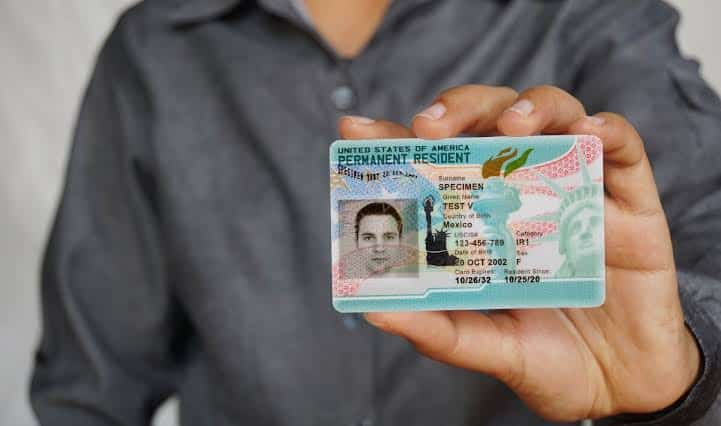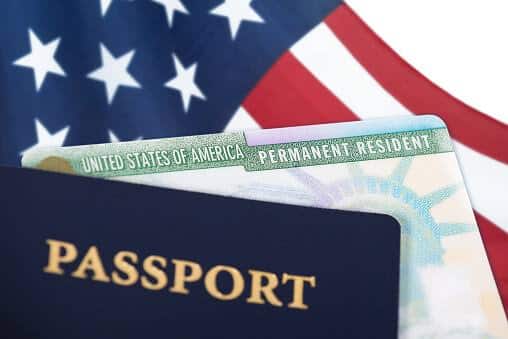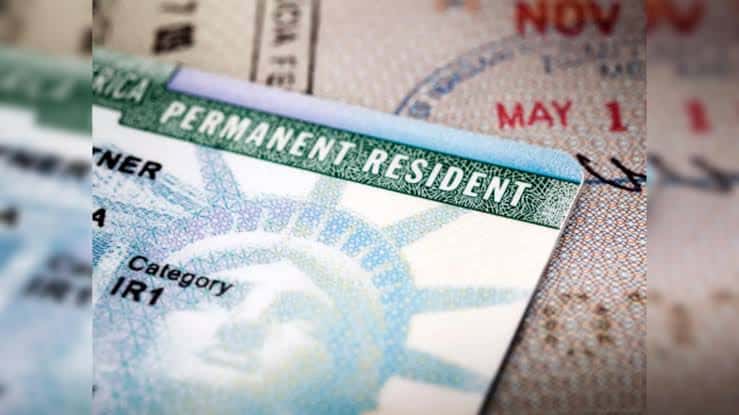Welcome for you are at the right place, I am going to put you through how to get a USA VISA for fruit picker Jobs. Follow the Process Below to apply. Do you think of finally moving over to the United States on a full-time basis? Getting this card is the gateway to fulfilling that dream and unlocking a world of opportunities in the land of the free. Carefully go through this article “How To Get A Green Card” to know how to go about it.
Whether you’re seeking to reunite with family, pursue career prospects, or simply embrace a new chapter in your life, understanding the intricacies of applying for this card is crucial.
In this comprehensive guide, we’ll walk you through everything you need to know about obtaining a Green Card. Also, we will help you understand the different pathways available and how to navigate the application process with confidence. By the end of this article, you’ll have a clear roadmap to embark on your journey towards lawful permanent residency in the United States.
So, let’s dive in and explore the steps, strategies, and tips that will empower you to realize your American dream and secure your place in this diverse and vibrant nation.
What Is A Green Card?
This is officially referred to as a Permanent Resident Card, is a crucial document that confers lawful permanent residency status upon individuals in the United States. Also, this coveted card signifies that its holder has been authorized to live and work indefinitely in the country, enjoying many of the same rights and privileges as American citizens.
Meanwhile, securing a this document opens up a multitude of opportunities for individuals and their families. It provides access to various benefits, including the ability to work freely in the U.S., pursue educational opportunities, access healthcare services, and even sponsor family members for their own Green Cards.
Recommended: Online Business Degree Programs Accredited

Types Of Green Cards
When it comes to obtaining a Green Card, there isn’t a one-size-fits-all approach. Instead, various pathways cater to different circumstances and eligibility criteria. Understanding the types of Green Cards available can help you navigate the application process more effectively and choose the option that best suits your situation.
1. Employment-Based Green Cards
For individuals seeking to immigrate to the United States for employment purposes, the employment-based Green Card category offers several avenues:
- EB-1 Priority Workers: Reserved for individuals with extraordinary abilities in their field, outstanding professors or researchers, and multinational executives or managers.
- EB-2 Professionals with Advanced Degrees or Exceptional Ability: This category includes individuals with advanced degrees or exceptional ability in their field, as well as individuals seeking national interest waivers.
- EB-3 Skilled Workers, Professionals, and Other Workers: Designed for skilled workers, professionals with bachelor’s degrees, and unskilled workers in positions that require less than two years of training or experience.
- EB-4 Special Immigrant Workers: This category encompasses special immigrant workers such as religious workers, broadcasters, and employees of certain international organizations.
2. Family-Based Green Cards
Family reunification is a cornerstone of U.S. immigration policy, and the family-based Green Card category facilitates the immigration of close relatives of U.S. citizens and lawful permanent residents:
- Immediate Relatives of U.S. Citizens: Includes spouses, unmarried children under 21 years of age, and parents of adult U.S. citizens.
- Family Preference Categories: These groups comprise unmarried children of U.S. citizens, spouses and unmarried children of lawful permanent residents, married children of U.S. citizens, and siblings of adult U.S. citizens.
3. Diversity Visa Lottery
The Diversity Visa Lottery, also known as the Green Card Lottery, provides an opportunity for individuals from countries with historically low rates of immigration to the United States to obtain a Green Card through a randomized lottery system.
4. Special Immigrant Categories
Certain individuals may be eligible for a Green Card through special immigrant categories, which are designated for individuals with unique circumstances:
- Refugees and Asylees: Individuals granted refugee or asylee status in the United States may be eligible to apply for a Green Card after meeting certain requirements.
- Victims of Human Trafficking and Other Crimes: Victims of human trafficking, domestic violence, and other qualifying crimes may be eligible for a Green Card under specific circumstances.
- Special Immigrant Juveniles: Children who have been declared dependent on a juvenile court may be eligible for a Green Card if it is determined that it is not advantageous for them to go back to their native country.
Benefits Of Having A Green Card
Obtaining a Green Card opens up a world of opportunities and benefits for individuals and their families. Also, these benefits ranges from employment opportunities to access to social services, here are some of the key advantages of holding a Green Card:
1. Employment Opportunities
One of the most significant benefits of having a Green Card is the ability to work freely in the United States. Unlike temporary work visas, which are tied to specific employers, Green Card holders can pursue employment opportunities across various industries and companies without needing sponsorship or authorization.
2. Access To Social Services
Green Card holders are eligible for a range of social services and benefits in the United States, including:
- Medicare: Green Card holders may qualify for Medicare, the federal health insurance program for individuals aged 65 and older, as well as certain younger individuals with disabilities.
- Social Security Benefits: Green Card holders may be eligible for Social Security benefits, including retirement, disability, and survivor benefits, depending on their work history and contributions.
3. Education Opportunities
Green Card holders are able to avail educational opportunities within the United States, such as:
- In-State Tuition Rates: Many colleges and universities offer reduced tuition rates for in-state residents, and Green Card holders may qualify for these lower rates, making higher education more affordable.
- Financial Aid: Green Card holders may be eligible for federal financial aid programs, including grants, loans, and work-study opportunities, to help finance their education.
4. Pathway To Citizenship
Holding a Green Card is often the first step towards naturalization and becoming a U.S. citizen. While not required, naturalization offers additional rights and privileges, including the ability to vote in federal elections, run for elected office, and obtain a U.S. passport for international travel.
5. Sponsorship Of Family Members
Green Card holders can sponsor certain family members for their own Green Cards, facilitating family reunification and allowing loved ones to join them in the United States permanently. Eligible family members may include spouses, children, and parents, depending on the Green Card holder’s relationship and immigration status.
Eligibility Criteria For Obtaining A Green Card
Securing a Green Card is a significant milestone for individuals seeking to establish permanent residency in the United States. However, eligibility requirements vary depending on the specific pathway through which one applies. Here’s a detailed overview of the eligibility criteria for obtaining a Green Card:
1. Employment-Based Green Cards:
- Job Offer: Generally, individuals applying for an employment-based Green Card must have a job offer from a U.S. employer. The employer will foot the immigration bills.
- Skills and Qualifications: Depending on the specific category, applicants may need to demonstrate specialized skills, professional qualifications, or academic credentials relevant to their occupation.
- Labor Certification: In some cases, employers may need to obtain a labor certification from the U.S. Department of Labor. This is to show that they lack competent U.S. workers to stand in the space.
2. Family-Based Green Cards:
- Relationship to U.S. Citizen or Permanent Resident: To qualify for a family-based Green Card, applicants must have a qualifying relationship with a U.S. citizen or lawful permanent resident. Eligible relationships may include spouses, parents, children, and siblings, depending on the category.
- Petition by a Sponsor: In most cases, the eligible family member who is already a U.S. citizen or permanent resident must file a petition on behalf of the applicant, demonstrating the familial relationship and their intention to sponsor the applicant’s immigration.
3. Diversity Visa Lottery:
- Country of Eligibility: Candidates must originate from nations with traditionally minimal immigration rates to the United States. Each year, the U.S. Department of State publishes a list of eligible countries for the Diversity Visa Lottery.
- Education or Work Experience: Applicants must have either a high school diploma or its equivalent. Also, they can have two years of work experience within the past five years in a two year training-based occupation.
4. Special Immigrant Categories:
- Specific Qualifying Criteria: Special immigrant categories encompass a diverse range of individuals, including refugees, asylees, religious workers, victims of human trafficking, and certain special immigrant workers. Each category has its own set of qualifying criteria and eligibility requirements.
Steps To Apply For A Green Card
Obtaining a Green Card is a multi-step process that requires careful preparation and attention to detail. While the specific steps may vary depending on the pathway through which you are applying, here is a general overview of the typical process:
1. Determine Your Eligibility:
Before applying for a Green Card, it’s essential to determine your eligibility based on your immigration category. Whether you’re applying through employment, family sponsorship, the Diversity Visa Lottery, or a special immigrant category, understanding the requirements specific to your situation is crucial.
2. Obtain Sponsorship (if applicable):
If you are applying for a family-based or employment-based Green Card, you may need a sponsor to petition on your behalf. This sponsor could be a family member who is a U.S. citizen or permanent resident, or an employer willing to sponsor your immigration.
3. Gather Required Documents:
Once you’ve determined your eligibility and secured sponsorship (if applicable), gather all the necessary documents for your Green Card application. These may include identification documents, proof of relationship (for family-based applications), employment letters, educational certificates, and any other supporting evidence required for your specific immigration category.
4. File Form I-485 (Application to Register Permanent Residence or Adjust Status):
The Form I-485 is the primary application for adjusting your status to that of a lawful permanent resident. Submit this form along with all required documents to the United States Citizenship and Immigration Services (USCIS). Be sure to pay the required filing fee and include any additional forms or supporting evidence as instructed.
5. Attend Biometrics Appointment:
After submitting your Form I-485, you will be scheduled for a biometrics appointment at a USCIS Application Support Center. During this appointment, your fingerprints, photograph, and signature will be collected for background and security checks.
6. Attend Interview (if required):
Depending on your immigration category and individual circumstances, you may be required to attend an interview at a USCIS field office. The purpose of the interview is to verify the information provided in your application and assess your eligibility for a Green Card. Be prepared to answer questions about your background, immigration history, and intentions for residing in the United States.
7. Wait For Decision:
After completing all necessary steps in the application process, wait for a decision on your Green Card application from USCIS. If approved, you will receive your Green Card by mail. If denied, you will receive a written explanation of the reasons for denial and information on how to appeal the decision, if applicable.
Recommended: Patent Law Attorneys

Common Challenges In Obtaining A Green Card
While obtaining a Green Card is a significant milestone on the path to lawful permanent residency in the United States, the process is not without its challenges. From lengthy processing times to complex immigration laws, here are some common obstacles individuals may encounter when seeking to obtain a Green Card:
1. Delays In Processing:
One of the most common challenges applicants face is delays in processing their Green Card applications. Due to high demand and limited resources, USCIS processing times can vary significantly, leading to frustration and uncertainty for applicants.
2. Request For Additional Evidence:
During the review process, USCIS may request additional evidence or documentation to support your Green Card application. Failure to provide the requested information in a timely manner can result in further delays or even denial of your application.
3. Immigration Backlogs:
Immigration backlogs, particularly in certain visa categories, can significantly prolong the Green Card application process. These backlogs may be due to annual quotas, country-specific limitations, or changes in immigration policies.
4. Inadmissibility Issues:
Individuals with certain criminal convictions, immigration violations, or health-related issues may be deemed inadmissible and ineligible for a Green Card. Navigating these inadmissibility issues can be complex and may require the assistance of an immigration attorney.
5. Changing Immigration Policies:
Changes in immigration policies and regulations can impact the Green Card application process, leading to uncertainty for applicants. Staying informed about current immigration laws and policies is essential for navigating these challenges effectively.
6. Cost Of The Application Process:
The cost of applying for a Green Card, including filing fees, medical examinations, and attorney fees, can be prohibitive for some individuals and families. Finding affordable resources and exploring fee waiver options may help mitigate this challenge.
7. Language And Cultural Barriers:
For individuals whose first language is not English or who are unfamiliar with U.S. immigration processes, language and cultural barriers can pose significant challenges. Seeking assistance from bilingual or culturally competent resources can help overcome these obstacles.
Tips For A Successful Green Card Application
Securing a Green Card is a significant milestone in the journey towards permanent residency in the United States. To increase your chances of success and navigate the application process smoothly, consider the following tips:
1. Understand Your Eligibility:
Before applying for a Green Card, thoroughly research and understand the eligibility requirements for your specific immigration category. Whether you’re applying through employment, family sponsorship, the Diversity Visa Lottery, or a special immigrant category, ensure that you meet all the necessary criteria.
2. Seek Professional Assistance If Needed:
The Green Card application process can be complex, and navigating it alone may be daunting. Consider seeking assistance from an experienced immigration attorney or accredited representative who can provide guidance, review your application for accuracy, and help you address any potential challenges.
3. Be Thorough And Honest In Your Application:
When completing your Green Card application forms, provide accurate and truthful information. Any inaccuracies or omissions could lead to delays or even denial of your application. Double-check all documents and information before submission to ensure completeness and accuracy.
4. Keep Track Of Application Status:
After submitting your Green Card application, stay informed about its status by regularly checking the USCIS website or using the USCIS Case Status Online tool. This will allow you to track the progress of your application and be prepared for any requests for additional information or interviews.
5. Maintain Legal Status:
If you are applying for a Green Card from within the United States, ensure that you maintain legal status throughout the application process. This includes abiding by the terms of your current visa, such as not overstaying your authorized period of stay, and avoiding any actions that could jeopardize your eligibility for a Green Card.
6. Keep Copies Of All Documents:
Make copies of all documents submitted as part of your Green Card application, including forms, supporting evidence, and correspondence with USCIS. Keeping organized records will help you respond promptly to any requests for additional information and maintain a thorough record of your application process.
7. Be Patient And Persistent:
The Green Card application process can be lengthy and may involve unexpected delays or challenges. But, remain patient and persistent, and don’t hesitate to follow up with USCIS if you haven’t received updates on your application status within the expected timeframe.
Conclusion
Congratulations on reaching the end of our comprehensive guide. We touched the eligibility criteria, common challenges and implementing tips for success.
Obtaining this document is not just about securing legal residency in the United States. It’s about unlocking opportunities, pursuing dreams, and building a brighter future for yourself and your loved ones. Whether you’re seeking employment opportunities, reuniting with family, or escaping persecution in your home country, the Green Card opens doors to a world of possibilities in the land of opportunity.

